In Countless Ways, CHHSM’s Presence Adds to Richness of General Synod Experience
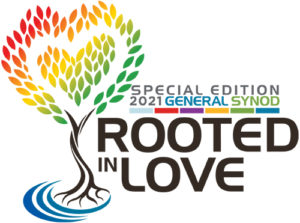
The UCC’s Council for Health and Human Service Ministries (CHHSM) played an important role throughout the denomination’s Thirty-Third General Synod, which closed Sunday evening, July 18. Sometimes prominent and sometimes behind the scenes, CHHSM’s presence and advocacy for health equity remained at the forefront of many Synod-related conversations — beginning with a Resolution of Witness declaring and responding to racism as a public health crisis submitted by CHHSM and the UCC Council for Racial and Ethnic Ministries (COREM).
“It was really heartening that the resolution we submitted with COREM on racism as a public health crisis was one of the first to be considered and approved by delegates, and that it happened on the first day of General Synod,” said the Rev. George Graham, CHHSM’s vice president. “I think that speaks volumes about the importance of the issue. And when we submitted it, we didn’t realize that the UCC national offices would be launching a ‘Join the Movement toward Racial Justice’ Initiative for the coming biennium. That opens up even greater possibilities for collaboration and partnership with many settings of the UCC to work together to implement the resolution.”

Some 96 percent of Synod delegates approved the resolution, setting the stage for a General Synod filled with discussion, presentations, and a renewed sense of mission in helping all settings of the church to become anti-racist.
Bookending CHHSM’s involvement in Synod was an implementation conversation on the resolution, which took place Saturday evening, July 17. The conversation provided rich resources that local churches and conferences could use in beginning the conversation about racial justice and health inequity in their own settings. The conversation was led by Barbara Baylor, a United Black Christians (UBC) board member and former convenor of the UCC’s Racial and Ethnic Health Disparities Task Force; the Rev. Dr. Elyse Berry, CHHSM’s associate for advocacy and leadership development, and Zillah Jackson Wesley, moderator of COREM.
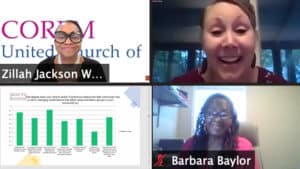
Baylor also had presented an educational session on the Racism as a Public Health Crisis resolution prior to the beginning of Synod. Berry encouraged everyone to watch it, calling it a “45-minute crash course on public health.”
Another highlight of CHHSM at Synod was its co-sponsorship of the Valerie E. Russell Lecture, held Saturday morning, July 17. The lecture series honors Russell, a visionary lay leader and justice advocate in the UCC, who died unexpectedly in 1997. This year’s lecturer was the internationally renowned researcher and educator Dr. Joy DeGruy, whose presentation on Post Traumatic Slave Syndrome focused on the importance of the church in truth telling, laying bare the injuries and beginning the healing caused by systemic racism in the world.
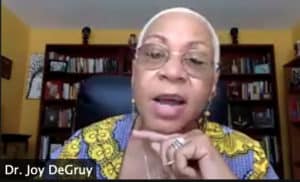
“The lessons learned during Dr. DeGruy’s lecture are painful, but we can be the vessels for healing in this world,” said Michael J. Readinger, president and CEO of CHHSM. “They will become the foundation for all of our future action.”
General Synod also served as a launching pad for CHHSM’s new Reason to have Hope: Responding to Racism as a Public Health Crisis course. Created in part at the request of the General Synod resolution committee, the 25-section, free resource is user-friendly and self-paced, and is geared for a group learning environment.
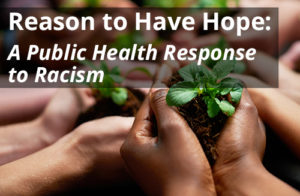
Reason to Have Hope includes history, current events, theology, stories of resilience and hope, and the intersections of race and social issues to help members of faith-based organizations and local churches learn from not only the material, but each other. The introduction of the course received a positive response during several Synod venues, including the implementation conversation.
Throughout the 7-day virtual event, CHHSM’s online booth in the Synod Exhibit Hall provided information and links to a variety of resources, as well as a way of connecting Synod goers to the many CHHSM members and available resources. Said Graham, “The CHHSM booth in the Exhibit Hall allowed us to make connections with people who attended General Synod, give them easy access to the ‘Reason to Have Hope’ course in response to the Racism as a Public Health Crisis resolution, and answer any questions they had about CHHSM.”

Paula Barker, CHHSM’s senior executive assistant for events and administration and corporate secretary, concurred. “I also loved being able to connect with people via live chat who don’t regularly attend General Synod in person, as well as with some of our wider church friends,” she said.
“I think CHHSM’s presence at General Synod 33 was truly special — from our resolution declaring racism as a public health crisis, our free course, and my personal favorite, the Valerie Russell luncheon featuring Dr. DeGruy,” Barker added. “Not only did I think she was special; hearing and seeing the number of calls for her to continue past the official stop time or promise to return means her spirit and words really resonated with the audience. As CHHSM continues to Be A Voice, it’s refreshing to be poured into by someone like Dr. DeGruy.”
CHHSM also had a presence in various workshops and gatherings, including a “Frequency of General Synod” discussion held July 13. CHHSM’s Readinger is on the General Synod Frequency Committee, part of the UCC Board. The discussion on the frequency of General Synod began many years ago, he said, and it is clear that the conversation still elicits much passion from UCC members.
“My big ‘A-ha!’ moment was in how open minded people were about the prospect of changing things, and the many ideas they presented to offer new ways of gathering,” Readinger said. “The most important things to people were the worships, connecting with old friends and meeting new ones, conducting the business of the UCC, and COOKIES, because baking and delivering cookies to Synod connects the local organizers and churches to the General Synod.” Synod cookies have long been a favorite among Synod goers.
“When we discussed the priorities to be considered in making a decision, mission and ministry were at the top of the list, as were using facts and data to determine alternative structures,” added Readinger. “We should meet at General Synod to do God’s work.”
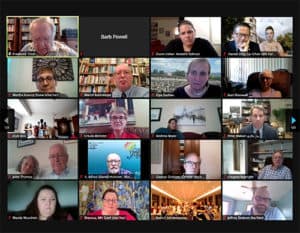
Two celebrations also added to the joy of this year’s General Synod. On July 13, the UCC’s 40-year partnership with the Evangelical Church in Germany (UEK) was honored. CHHSM has a long-standing partnership with Diakonie Rheinland-Westfalen-Lippe (RWL), the health and human services arm of the Evangelical Church in Germany. The celebration noted the sometimes profound influence the two denominations have had on each other over the years. Elga Zachau of the UEK in Westphalia, noted that the UCC’s influence on the UEK in terms of such justice issues as diversity and LGBTQA advocacy has led to many younger people becoming involved in the German church.
An “Evening of Celebration” held July 15 celebrated many of the organizations and ministries of the denomination doing the work of the church in locations across the country and world. Among those honored were CHHSM and its members, as well as the ongoing ministry of Back Bay Mission in Biloxi, Miss. CHHSM member Back Bay, which celebrates its 100th anniversary in 2022, serves some 2,000 people annually, and is known for giving people “a hand up, not necessarily a hand out.” Nollau Leadership Institute graduate and Diakonal Minister Kenney Washington, Back Bay’s director of client services and a CHHSM board member, was one of the featured speakers in the Back Bay presentation.
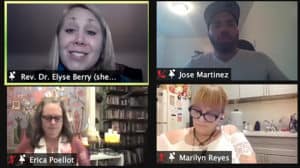
One of CHHSM’s newest partnerships is with the UCC’s Overdose and Drug Use Ministries (ODUM). During Synod, CHHSM’s participated in ODUM’s workshop on “Transforming the Overdose Crisis.” The workshop was taped live July 8 and will be available to all Synod delegates and visitors through the end of August. It featured presentations from Berry and three representatives of the National Harm Reduction Coalition, an ODUM partner: Erica Poellot, ODUM project director and director of faith community partnerships for the Harm Reduction Coalition in New York City; Marilyn Reyes, a senior peer with Harm Reduction Educators in New York City; and Jose Martinez, a harm reduction associate with the National Harm Reduction Coalition.
The ODUM workshop featured personal stories as well as ways to change attitudes and responses to people who use drugs. Its overarching theme was supporting and loving, and showing God’s love to people with lived experience of drug use, and changing perception from a punitive attitude of retribution to one of restorative justice.
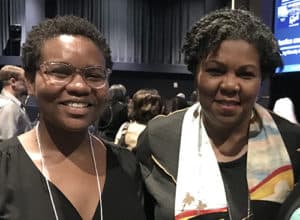
One of the benefits of the UCC’s biennial gathering is the opportunity for local church members and people new to the UCC to learn more. That was the case for former CHHSM Rev. Jerry Paul Scholar Essence Ellis. Ellis, who recently earned her M.Div. degree from Yale Divinity School, has been named the first-ever CHHSM and JLCM United Church of Christ Fellow. The one-year fellowship is geared toward preparing the fellow to become a leader working at the intersections of theology, public health, racial justice, gender justice, and other liberative frameworks.
“Attending General Synod for the first time was very exciting,” said Ellis. “I’m relatively new to the UCC so being able to experience the coming together of different national offices was helpful for understanding the many moving pieces of the UCC.”
Ellis said the two sessions she enjoyed most were the African American Sister Circle and the Pensions Boards presentation — each for very different reasons.
“I was a bit nervous going into a virtual Sister Circle and not really knowing anyone, but in true Sister Circle fashion, the zoom room felt open and welcome when I logged in,” she said. “The Pension Boards session had a different vibe, but it was very informative. The panelists were great about giving full answers and even when questions and answers were tense, everyone kept a level head and even connected at the end to ask clarifying questions or give clarifying answers. I’m definitely looking forward to being able to go to General Synod in person in 2023.”
Ellis’ experiences illustrated the feeling most Synod attendees came away with.
“The UCC General Synod is an example of how so many different parts of the church come together in partnership to create a more just world,” said Readinger. “There was not always unanimous agreement, and there were some serious and deep disagreements at times. But the work got done, everyone acted with mutual respect, and we proved that we are a church on the move.”
Join Our Mailing LIst
"*" indicates required fields
Follow on Facebook
New Resident Finds Belonging at Emmaus Homes - CHHSM
www.chhsm.org
Heather’s journey toward independence has been nothing short of inspiring. Since moving into her new home last year, Heather’s world has expanded in ways she never imagined. Leaving the familiarit...